02nd March 2021
The Zambian-German Agricultural Knowledge and Training Centre (AKTC) is a project involved in the promotion of modern sustainable farming practices, among emergent and commercial farmers in Zambia. To achieve this, AKTC undertakes crop trials in soya bean, potato, maize and cover crop production. AKTC is currently undertaking some field trials on the role of cover crops in maintaining a healthy soil structure for sustainable crop production. To showcase and share the experience and knowledge from these field trails, AKTC regularly organises Field days and trainings for its target groups.
On the second of March 2021, AKTC hosted a field day, in cooperation with Barenbrug, targeting commercial farmers from the Chisamba area and from Central province. The field day was held at AKTC Chaloshi farm based on GART along the great north road.
Barenbrug, is a South African company founded in 1904. It specialises in plant breeding, seed production and the international marketing of seeds for pasture cover crops, turf, forage and legumes. Barenbrug also carries out a lot of research in different climatic zones and can therefore offer solutions to highly specific and localized cases. Barenbrug and AKTC set up a small field trial presenting different cover crops and cover crop mixes for the field day.
In attendance were 33 farmers, coming from Chisamba, Mkushi and Ndola districts of Central Province and Copperbelt Provinces. Representatives from agrochemical and seed companies such as Seed Co and Amiran from Lusaka Province were also in attendance.
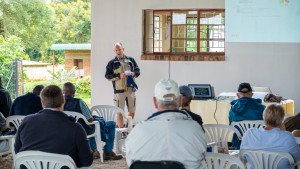
Picture 1: Helmut Anschuetz, AKTC Team Leader delivering his welcoming remarks
To open the event, Mr. Helmut Anschuetz, team leader of AKTC gave some welcoming remarks to all attendees and introduced the training centre. Mr. Anschütz also stated the importance of promoting sustainable agriculture at AKTC. Three presenters then discussed sustainable agriculture in depth, with a large focus on cover crops and natural products.
The first presentation was given by AKTC’s short term expert, Mr. Adrian Bignell. He is a farmer practicing conservation agriculture for 18 years. His farm is located in Mazabuka district, in the Southern Province of Zambia. Mr. Bignell is an expert in cover crops who has done several trials on his farm. In his presentation, Mr. Bignell gave some practical experiences on how the cultivation of cover crops has helped him survive the drought experienced in the southern part of Zambia in the past years. He also mentioned how he has managed to make financial savings, by cutting the cost of fertilizer through cultivating different cover crops. Additionally, Mr. Bignell explained how important it is to identify which cover crop mix works best in different regions and that different soils lack different nutrients. Therefore, the focus should be to improve the insufficient nutrients while maintaining the already existing.
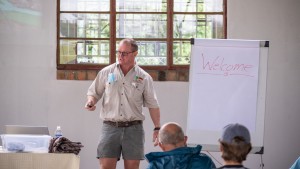
Picture 2: Adrian Bignell, AKTC Short Term Expert giving his presentation.
The biggest lesson learned from Mr. Bignell is, that in good rainy seasons the difference between conservation agriculture and conventional agriculture is not as big. The effects of conservation agriculture really pay off during dry years. Increased soil moisture, better soil life and les wind and water erosion make in dry years the difference between a profitable and a non-profitable crop.
Dr. Derek Askew GM of Puricare International and Director of Rock Agriculture from South Africa gave a presentatio
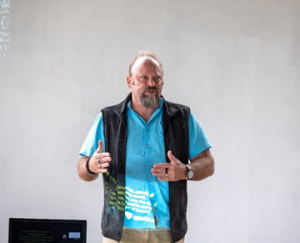
n on an organic product called Nature Guard (NG). In his presentation, Dr.
Derek mentioned that Nature Guard is a product made from an extract of pine wood vinegar which is a natural pest repellent, composter and insecticide. He indicated that with these characteristics, the product
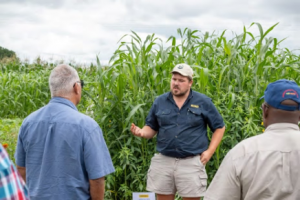 The day’s third presenter, Mr Abel Nell from Barenbrug based his presentation on cover crop mixes and the cover crop trail which was set up by Barenbrug and AKTC. In his presentation, he explained the purpose of different cover crop mixes and some principles followed in making suitable cover crop mix. Some of the principles he mentioned included understanding different functions of each of the cover crop e.g., those suitable for weed suspension, nitrogen fixation, soil improvement and bio fumigation, among others. He concluded his presentation with a visit to the AKTC cover crop field demonstration, where everyone got to see the different mixes and crops.
The day’s third presenter, Mr Abel Nell from Barenbrug based his presentation on cover crop mixes and the cover crop trail which was set up by Barenbrug and AKTC. In his presentation, he explained the purpose of different cover crop mixes and some principles followed in making suitable cover crop mix. Some of the principles he mentioned included understanding different functions of each of the cover crop e.g., those suitable for weed suspension, nitrogen fixation, soil improvement and bio fumigation, among others. He concluded his presentation with a visit to the AKTC cover crop field demonstration, where everyone got to see the different mixes and crops.
Picture 4: Field Tour with Mr. Abel Nell from BARENBRUG
The event was summarised by a tour of the cover crop field trials. During the tour, attendees were exposed to a wide range of cover crops which included pearl hybrid millet, sweet choice forage sorghum, highworth dolichos, betswit cowpeas, common pearl millet, black sun hemp, red sun hemp, flax, commander chicory and many others. The event was even more interesting in the field as farmers were seen discussing in groups and inquiring more about the specifications for each crop
.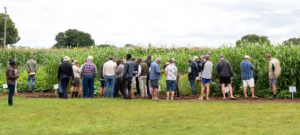
Picture 5: Farmers discussing the cover crop demonstrations.
It is certainly undeniable that a healthy soil structure greatly contributes to a healthy crop production, that in turn leads to a bumper harvest. Growing of cover crops in your fields is one way that will help maintain a good soil structure, suppress the weeds while at the same time lessening the requirements for farming inputs such as fertiliser. As an agricultural training centre, we hope that every farmer can adopt the growing of cover crops on their farms because not only are they assured of a good harvest with less inputs but also maintain a healthy environment, free from degradation caused by poor farming activities.
Contact:
Helmut Anschuetz helmut.anschuetz@afci.de
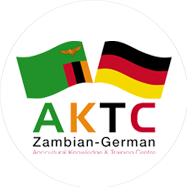
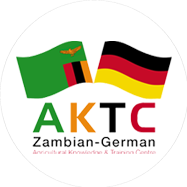
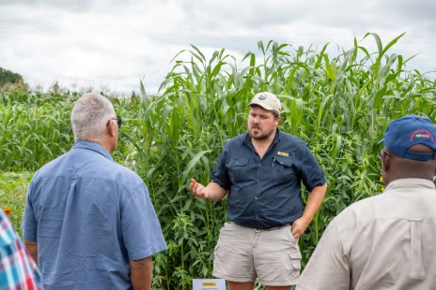
Leave A Comment